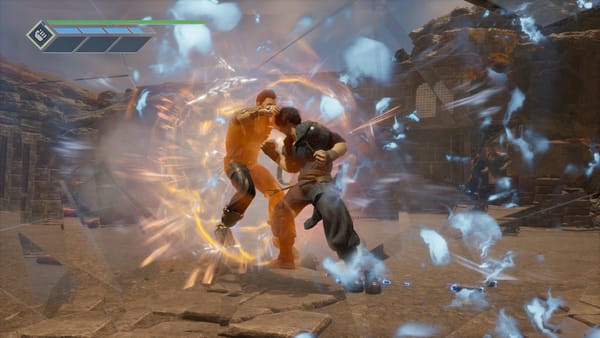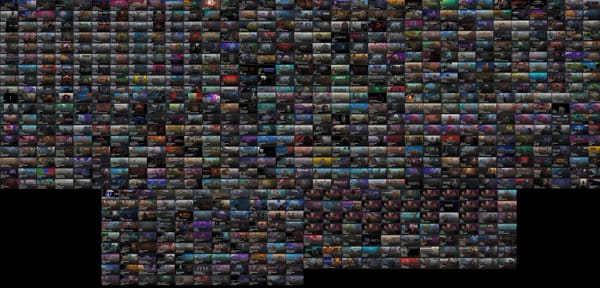#242: Back Issues 2023
Looking back on the highlights of another year of Hit Points.

Well hello there! Welcome to Back Issues, which debuted last year and seeks to pick out — perhaps even celebrate! — my best/funniest/least annoying work from across the year. I like to think of Hit Points as having a little of the old print spirit; think of this as a sort of email equivalent of pulling some old issues down from the shelf, and reconsidering their contents with the benefit of hindsight.
The readership of this humble publication has risen by almost 80% over the course of 2023; most of you will therefore find something new to read in the below selection. Some of them live behind the subscriber paywall, so I have just reactivated the free 7-day trial offer so you can read them all for free (and a bunch of other stuff too, if you like). A wee Christmas present to you all. (I tried to de-paywall the entire archive, which I realise would have been a much better present, but it appears Substack won’t let me. Argh.)
This has been a rough year, all things considered, and I have had to look pretty hard for good, thought-provoking, or uplifting work amidst all the doom-mongering and talk of layoffs. But what follows is a good balance, I think, a fair reflection of what Hit Points is — or at least, is capable of being on its better days. Presenting: Back Issues 2023!
JANUARY
The year began, with dreary predictability, with a resolution of sorts: I wanted to discard one of the many bad habits acquired from my career in videogame journalism, and stop obsessing with the new. While this really didn’t work out in a year that turned out to be stacked wall-to-wall with amazing games, it got off to a good start with a brief, but passionate, romance with Final Fantasy XIV — a game that I really enjoyed, and that pressed a lot of my buttons, but in a way that made me feel a bit weird. It made me realise how suspicious we have become in an era where games are able to so specifically, and precisely, target our pleasure receptors. What are they really up to?
#176: Simple pleasures, January 20
There is a lack of understanding, I reckon, of why the ‘traditional’ gaming community is so loudly averse to free-to-play, to mobile, and to live services. It’s not that we see them as ‘not real games’, that we don’t want to share our toys with the casual crowd, or that we think they’re all innately exploitative. There’s a bit of that, sure, but I think the main reason is that they take the very things that made us all fall in love with games in the first place — the quick-hit spikes of chemical pleasure when we do something that feels good — and retool them into things that can psychologically manipulate us into spending more money. It is quite natural to want to push back against that, I think. It is probably quite healthy, even.
FEBRUARY
A raft of live-service games were closed down in the early part of the year, kicking off what would turn out to be something of a recurring theme; while 2023 will likely be remembered for the jarring dissonance of an avalanche of high-quality games being produced by an industry beset with widespread layoffs, this was also the year where the folly of joining the live-service gold rush became abundantly clear. Here I mull over the difficulties of finding success with a live game on console and PC, and wonder — for the first, but not last, time in 2023 — just how much longer this trend can continue.
#181: Death in service, February 7
While live-service developers are chasing the dream, and aping the style, of today’s console and PC smash hits, the roots of this sort of thing lie in the boggy, bloody battlefield of the free-to-play mobile space. Yet the pretenders to Fortnite’s throne have failed to notice the smartphone sector’s greatest trick: the soft launch. Mobile-game developers don’t just throw a game straight out into the world. They launch it in a select few territories, measure its performance against their key performance indicators, then turn a few dials and see if things improve. If a game does well, they’ll announce it properly and launch it globally; if it doesn’t, they’ll quietly kill it off, turn their attention to their next prototype, and start over.
Needless to say, this is a much more efficient, and far less embarrassing, way of conducting live-service business. You know Supercell for its smash hits, its Hay Days and Clash Royales, but not its quiet little failures, which by the developer’s own admission outnumber its actual releases by a ratio of almost four to one. On console and PC, there is no real equivalent of this, no way for developers to test a theory at scale without making it available worldwide. Mobile developers quietly put their failures in the bin; on console and PC, we announce them on investor calls, showing the world our whole ass. This seems less than ideal, to me. Suboptimal.
MARCH
This month the much-loved actor Lance Reddick, known for his roles in The Wire, John Wick and a surprising number of videogames, sadly passed away age 61. I was deep into a Destiny relapse at the time, and found his continued presence in the game — he voiced one of the lead NPCs, Commander Zavala — both slightly morbid and rather sweet. The Destiny community loved the guy, not just because he was in the game but because he really seemed to understand it; his loss was immediately, keenly felt, both around the game’s community and within the game itself.
#189: Eyes up, March 22
When the original Destiny launched in 2014, Reddick was just one member of a starry ensemble cast. Over the years, the rest of the ensemble have been recast, or killed off, or in the case of Nathan Fillion, recast then killed off. Reddick, though, remained until the last. He was a rare constant in a game that has spent the best part of a decade in a constant state of change. New content arrives in the game every few months, old stuff retired to make room for it. Reddick saw it all.
He played it all, too. The reason for him sticking around all this time, it seems, is not because he was better, cheaper, or easier to work with than his fellow 2014 headliners — though he may well have been — but because he loved the game. I remember one of my Bungie friends telling me how stunned they were when Reddick, who had never previously given any indication that he played games, turned up to record his lines for one of Destiny’s early expansions, and spent his downtime between takes pestering them for info on the new guns. He apparently played the game the night before he died.
APRIL
You may not remember this — if you’re anything like me, you have blocked out much of the trauma of the Acquisition Blizzard saga — but for a while there it looked like it wasn’t going to happen. It was the UK’s regulator, the Competition and Markets Authority, that first took issue with the deal, and in one of the longest editions of the year Hit Points did Some Actual Journalism and tried to get its legal layman’s head around the regulator’s reasoning. This one’s Hit Points in a nutshell, I think, in the way it takes a deeper, level-headed look at the news of the day, but still manages to crowbar in some decent jokes.
#195: Blocking High, April 27
The reaction has been much as you’d expect. Microsoft has promised to appeal; Lulu Cheng Meservey has solemnly dragged her ‘epic memes’ folder to the Recycle Bin; the analyst community has either gone ‘I told you so’ or ‘this changes nothing’; stock prices have done stock-price things. Sony hasn’t said anything at all, presumably because Jim Ryan has been in a permanent state of Muttley.gif since the moment the ruling hit his inbox. I will admit I wasn’t entirely prepared for Activision to go full protection-racket and strongly imply that it will take its UK business elsewhere in light of the ruling, but in hindsight I should have expected nothing less from Kotick and his band of C-suite goobers. (Microsoft president Brad Smith has been doing much the same on the interview circuit this morning. Stop negging the UK, you lot. It’s the last thing we’re any good at.)
Also from April, this is another thing I like to think that Hit Points is good at: using its modest, but ever-growing audience as a sort of public confessional. Here I talk about my historic struggles with puzzle games, which always somehow contrive to make me feel stupider than I really am — or, perhaps, to expose my actual dumbness.
#193: Brain worms, April 6
And, look, this is fine, right? Not everything has to be for everyone. The feeling I get when trying to play something like Stephen’s Sausage Roll is no doubt the same sort of response other people have to learning combo strings in Street Fighter, mastering parry timings in Sekiro, or building a deck to beat the Heart in Slay The Spire. The difference, to my mind anyway, is that you can actually get better at all those things through practice or research; in a puzzle game, you can either follow the designer’s thought process or you can’t. You’ve either got the minerals or you haven’t, and there is no way — at least not that I’ve found — to bridge that gap short of looking up a solution, which of course defeats the purpose of the whole endeavour. From a design perspective, it must be incredibly difficult to guide struggling players towards a solution without giving too much away, and dampening down the magic of them working it out for themselves.
MAY
Most of the time, Hit Points operates a strict separation of powers, keeping its public-facing newsletter and shadowy game-consulting operation at a safe remove from each other. Sometimes, however, circumstances compel me to cross the streams a bit. So it proved when Phil Spencer, in a podcast appearance shortly after the crocked launch of Arkane’s Redfall, claimed Microsoft thought the game was in good shape because it had conducted a round of ‘mock reviews’. This secretive practice, in which former media types are brought in to play a game before release and help a company properly set expectations internally — and, if done slightly earlier, give the dev team feedback on areas there may still be time to fix — is very dear to Hit Points’ heart, and even more so to its mortgage payments.
#197: Mock the weak, May 5
The thing is, I can’t take Phil at his word here. It just doesn’t stack up. His suggestion is that the Xbox division, and particularly its management team, had no reason to dispute what the mock reviews were telling them. How is that possible? I have written dozens of mock reviews since I left Edge a few years ago, and I don’t think I’ve ever told a client something they didn’t already know. Most of the time I’m there to confirm suspicions, break deadlocks, or help overworked PRs prove to their bosses that they are not, in fact, about to release a Metacritic 95. I find it incredibly hard to believe that the Xbox division is set up in such a way that it has no insight into the state and quality of its firstparty games, though it would certainly explain a lot.
JUNE
Ah, not-E3 season. For so long the highlight of my year, and these days a dreary procession of artless, awkward platform-holder and publisher showcase streams. At the vanguard of this new-look movement is, of course, Geoff Keighley, whose Summer Game Fest broadcast somehow stood out as the nadir of yet another very boring summer. (A fun fact: Geoff emailed me about this one. He was very gracious, as you’d expect, though clearly wasn’t too pleased with me.)
#207: Sale of the century, June 9
Until last night I thought of Geoff Keighley as the game industry’s hardest-working hypeman; a profiteer, certainly, but one with noble intentions. I now realise he is just another venture capitalist. He has seen something that people like and is popular — in this case, a game-industry convention with an increasingly consumerist bent, that over the years has become the greatest celebration of videogames on the calendar — and squeezed himself into the middle of it. He has found new ways to monetise everyone involved, and made it worse than it was before while telling everyone, and himself, that it is better this way.
JULY
Another introspective one; the heat of high summer rather does that to me, I’m afraid. I had recently come to realise that my gaming decisions — over what to buy or download next, what to play when I finally sit down with a controller of an evening — were overwhelmingly being dictated by the word ‘should’. Indeed, the industry has spent the last decade reorienting itself around this very idea, building games and distribution models that nudge us towards certain behaviours and patterns of play.
#219: What you want, what you need, July 27
This is not a purely professional concern, I feel, not anymore. This cannot be solely considered a journo’s lament in an era where so many companies want us to play their games every day for the rest of our lives, and the best route they have devised to that goal is to turn our hobby into a series of jobs. You should be farming the latest event in your live-service game of choice, to make sure you get all the freebies and cosmetics. You should be grinding the latest battle pass to earn enough currency to pay for the next one. You should be starting the latest Game Pass game that everyone’s talking about, and finishing the one that’s leaving the service at the end of the month. You should be maintaining your Wordle streak, and tending all your other Wordlelikes. You should be playing this weekend beta, this time-limited demo, this fun seasonal event where you can dress your guy up like a dinosaur and bake cakes.
AUGUST
Nothing! Hit Points went on holiday. Man, that was nice. Must do that again one day.
SEPTEMBER
This was the month that Unity, after years spent walking around with an ominously burbling stomach, truly shat the bed. Its mercifully short-lived Runtime Fee policy sought to levy a charge on every install of a game that was made with the engine. Obviously the uproar caused the whole sorry mess to be walked back, and eventually led to Unity demon-king John Riccitiello being deposed. At the time, though, there was little to do except pour more fuel on the fire in the hope of shaming Unity into a change of heart.
#223: We must unite, September 13
I understand, and am sympathetic to, the instinct to focus on the details of this disaster. But it is important to note, and for Unity to understand, that this is not solely a question of specifics. This is a holistic flavour of evil, a sort of equal-opportunity ruination. It scorches the whole earth, affecting anyone and everything that makes a game using the engine and achieves a modest level of success. It is retroactive, applying not just to games launching after the policy change comes into effect, but those that were already on the market as well (fees will only be chargeable for installs that occur after January 1). It is permanent: the developer of a Unity game will still be paying the engine maker for new installs when they are in the care home. And it is unknowable, since Unity can change the price of the levy at any time (and knowing Riccitiello as we do, this will happen fairly often, and it will only ever move in one direction).
OCTOBER
For years, Tim Sweeney had seemed like that rare sort of billionaire: one prepared to use his power and fortune for something approaching the common good. He bought thousands of acres of land in North Carolina for conservation, funded costly legal battles to seek more favourable app-store terms for developers, built a PC games store to challenge the dominance of Steam, and all that. Then as 2023 was winding down he laid off hundreds of staff, gutted out a number of studios, and admitted it was all his fault — then made everyone around him pay the price.
#228: Nitefall, October 4
These moves were predicated on a set of circumstances which Epic presumably believed would stay the same forever — the success of Fortnite, the availability of cheap capital — and some hopes and dreams it arrogantly assumed would come true: the metaverse made real, with Fortnite at its vanguard; Steam reined in, if not entirely conquered; Apple and Google under court orders to change their ways. The reality of things is, of course, rather different. Fortnite’s numbers are down, its revenue eaten into by the game’s Robloxification. The Epic Games Store has failed, its architect Sergiy Galyonkin moving on after the layoffs, Steam weathering its challenge with barely a scratch. The app store lawsuit has failed all the way up to the supreme court, where it will fail one final time. The metaverse, predictably, obviously, is still not a thing.
NOVEMBER
I’d had a version of this rattling around in my head for months, and the eventual result is for my money the best thing I’ve written all year. (Judging by website traffic and my signup stats, I am not alone in this belief.) It’s about a number of things — games media, SEO, generative machine learning and capitalism, among others — but if it’s about One Big Thing it’s the apparent death of the internet, at least as we know it today. If you only click one link in today’s edition, I recommend you make it this one.
#235: Machine killer, November 16
Over the years the internet has developed an unkickable, highly debilitating addiction to advertising, cementing Google as the web’s most dominant force. Media executives long ago stopped caring about how high-quality or well-regarded their publications are, and focused solely on how well they monetise. Editorial teams must now divide their commissioning decisions between what they think their loyal readers will be interested in, and what Google Trends tells them drive-by readers are looking for, balancing their ever-dwindling resources between the work that they are passionate about and the work that pays the bills. Throughout there is the constant risk of a Google update killing their search rankings, an economic crisis tanking the ad economy, or a growth-at-all-costs exec team coming to their desk one morning with an axe. This is no way to make a living.
DECEMBER
Yep, Keighley again, sorry. I don’t think I need to give too much context on this because it was only a couple of weeks ago, and the discourse is doubtless still as fresh in your memory as it is in mine.
#240: And the band played on, December 8
Developers are merely set dressing at The Game Awards, the big-name attendees highlighted via humblebrag in Keighley’s opening monologue and the hoi polloi shown in camera cutaways, in their nice dresses and best sport coats, to maintain the pretence that this is more than just another not-E3. I wanted to see the Baldur’s Gate gang’s faces as they won yet another award, the realisation slowly dawning that they were having One Of Those Nights. I wanted to see Larian CEO Swen Vincke clunking to the stage in his daft armour for a fourth, fifth and sixth time, struggling to work out what to say after he’s already thanked the entire team, their pets and everyone he has ever personally met while reckoning in realtime with the realisation that his life’s work is finally reaching its apex. There was far too little of this sort of thing. Thomas Puha, comms chief at Remedy and one of the great Hit Points chums, was seen to throw himself back in his chair at the unveiling one of Alan Wake 2’s trio of awards, gazing to the heavens as all those years of work, worry and stress left his body at once in a flood of joy and relief. Actual human emotion. That’s the shit. I will happily stay up until 4am every night of the week for stuff like that.
There you go! That’s another year in the books. If you’ve made it this far, thank you so much. If you’ve enjoyed it, and are not yet part of the fully paid-up Hit Points Crew, perhaps I might interest you in a paid subscription? Just £4 a month gets you exclusive editions, access to the full Hit Points archive, and my eternal love and respect. (You’ll also be able to read the Hit Points Reader Awards tomorrow, ahead of the ‘proper’ Hit Points Awards on Friday.)
With no ad revenue, sponsorship or corporate backing behind it, Hit Points only exists because of the generosity and support of its readers. To those of you who help fund this thing I offer my most heartfelt, humble thanks. Here’s to the next one.





